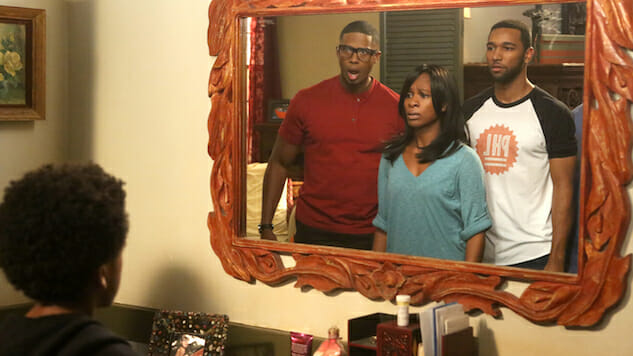Hey, It’s Always Sunny in Philadelphia, Maybe Don’t Joke About Black Kids Getting Shot
Photos c/o FXX
If pressed, I would say that 80% of It’s Always Sunny in Philadelphia episodes sound shocking in theory. “Charlie Gets Molested.” “Mac and Charlie Die.” “Charlie’s Mom Has Cancer.” But after eleven seasons, the show is still consistently funny and much, much smarter than most other television comedies. Always Sunny has produced some of the best TV satire of the last eleven years, inspiring a new generation of fearless storytellers that dominate comedy today. I’m one of its biggest fans, and it inspired me to go into comedy myself. And yet, by the end of last week’s “The Gang Turns Black,” I found myself shaken and deeply unsettled.
The well–reviewed twelfth season premiere begins as the gang settles in for a movie night with Old Black Man, the homeless man who has slept in Dee’s apartment since season eleven. While defending the gang’s movie choice—The Wiz, naturally—Dennis asserts that everyone’s having a hard time in America, not just black people. Suddenly, a surge of electricity from a storm hits the building and electrocutes the gang. When they wake up, they find themselves transformed into black people—in Charlie’s case, a young black child. In song, they conclude that they’ve become part of a classic body-switch story like “The Hot Chick” or “Quantum Leap,” and spend most of the episode trying to figure out what the rules are “when you’ve just turned black / and you can’t switch back.” In other words: what lesson must they learn about race so they can go back to not caring about race?
By the end of the episode, they’ve learned no lesson worthy enough to lift the spell. There were a few false starts—don’t assume black kids are fatherless, don’t assume black people will ruin your credit—that were mostly tempered by one or more of the gang suggesting the lesson only applied to their particular circumstances. Then, when they’re approached by a group of cops, Charlie steps forward, having had a good rapport in an earlier interrogation scene. But, of course, this is a Race Episode, so when Charlie holds up a toy train, the officers—who see him as a young black boy—think it’s a gun. They shoot him four times in the chest.
We see the first two shots hit Charlie before the scene cuts to his black counterpart, knocking the boy to the ground, bloodied, still holding onto the train. It’s a blatant evocation of the killings of Trayvon Martin, Michael Brown, Tamir Rice and countless others. After a moment of freakout—literally, ten seconds after the first shot—the gang, including White Charlie, are singing again: “Let’s click our heels together / and pray we leave forever / ‘cause we just learned our lesson and we want to go home.” “White home!” Frank clarifies.
The scene is disturbing for several reasons. For me, the most astounding is that a group of writers, producers and a network signed off on a scene depicting the police shooting of an unarmed black person. I can’t help but question the coopting of this very real, pervasive and current tragedy for a pretty obvious joke. Worse, it’s not just a joke—it’s a product. These people are making money, lots and lots of money, off the image of a black child’s murder. Yes, it was part of a larger piece of satire, but to what end? At the episode’s conclusion we learn that it was all Old Black Man’s dream. The gang hasn’t actually learned any lesson. We just watched a black kid get murdered by the police for nothing.
Could this piece of satire really justify the commodification of one of our greatest modern injustices? What exactly is gained by Always Sunny replicating the horrific, stomach-churning images that have flashed again and again across my social media feeds and every news station?
Full disclosure: I am black. I am a woman. I am a TV writer on a network comedy. Always Sunny is the show that made me want to write for television in the first place, largely because it threw out all of the rules and standards of the shows I was watching. When it premiered in 2005, it was the funniest thing that my tiny 13-year-old brain could conceive of. I’ve watched it enough to know I shouldn’t expect a decisive moral takeaway from any episode. And as a writer I understand the impulse to heighten the episode’s central tension—“maybe it is hard to be a black person, maybe it’s not!”—to the highest level, but this ultimately rings hollow. That police shootings are bad and disproportionately affect black people isn’t a particularly bold thesis. In fact, I think it’s probably entirely uncontroversial to Always Sunny’s viewership. Nobody needs to get shot by police for the gang to realize that black people sometimes get shot by the police. In this light, the shooting reads more as an attempt to shock than a gesture toward any clear, conclusive point about race.


